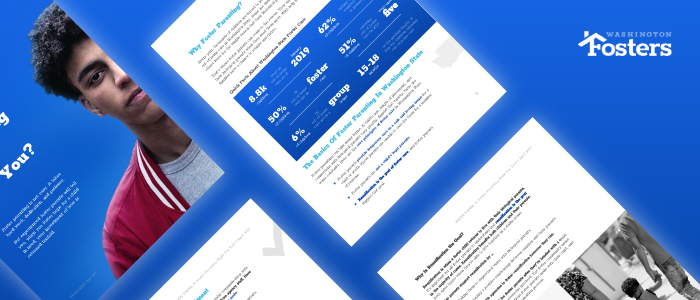We’re excited to announce a new resource: Is Foster Parenting Right For You?
In it, you’ll find clear answers to the most common questions families have about becoming a foster parent.
You'll get an overview of the licensing process and the typical commitments you can expect to make as a foster parent. You'll also discover the possible paths of foster children, from placement in a foster home to being reunited with their biological parents.
Becoming a foster parent in Washington State is a big decision for any family. There’s a lot of information available to help you make that decision. But, much of it is littered with myths and exaggerations about the process, the reality, and the goals of foster care. We’d love to help clear it up.
Download your copy of Is Foster Parenting Right For You?
Here are the topics you’ll find inside:
- Why Foster Parenting?
- The Basics Of Foster Parenting In Washington State
- Questions To Think Through
- Understanding The Commitment
- Choosing Between State And Private Agencies
- Navigating The Licensing Process
- You Can Do This. We Can Help.
Here’s a quick preview:
The Basics Of Foster Parenting In Washington State
Foster parenting can take many forms. A child’s age, placement term, and connections with biological parents vary greatly. Amidst that variety, there are some constants.
Here are the core principles of foster care in Washington State.
- Foster parents provide temporary care in a safe and loving home for a child or youth whose parents are unable to care for them for a number of reasons.
- Foster parents are not a child’s legal parents.
- Reunification is the goal of foster care, and foster parents support that goal.
Why is Reunification the Goal?
Reunification is when a foster child returns to live with their biological parents. It’s important for all foster parents to understand that this is the goal in the majority of cases.
Reunification benefits children and their parents, who thrive when they’re able to live together in a stable home.
Foster parents support this by:
- Assisting with coordinating supervised visits with biological parents
- Encouraging a positive relationship between children and their parents
- Working with agencies to foster reunification however they can.
Reunification can be hard for foster parents that bond with a child, but it’s the best outcome for everyone involved. And, for foster parents, there are abundant resources to support you when your child transitions back to their home.
Meet the Selembos — A Washington State Foster Family
When Josh was born, he tested positive for drugs. Both his parents were addicts. At just three months old, he transitioned into foster care with the Selembo family.
At the same time, Josh’s dad went into rehab. However, his mom did not. Throughout the next year, Josh’s dad fought his addiction and got better. He began visiting Josh and the Selembo family.
After a year, Josh’s dad was ready to bring him home. The Selembos continued to support the family, watching Josh on weekdays while his father was at work, and they continue to be close friends, helping each other whenever necessary to foster a safe, happy life for Josh.
The Selembo story is not unusual. You can foster support for a family who needs you right now.
Find out if it’s time for you to foster hope for a child. Download Is Foster Parenting Right For You?





